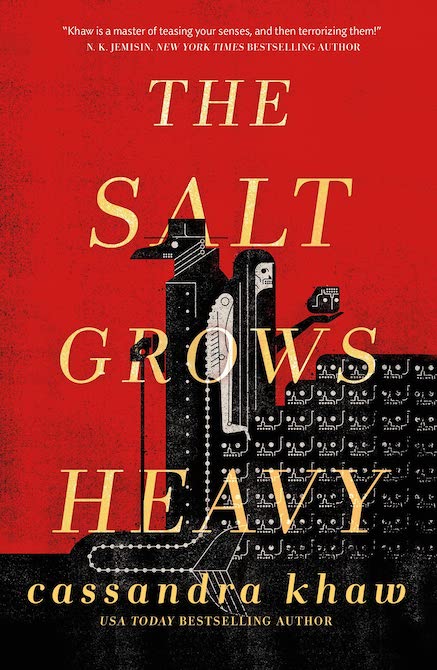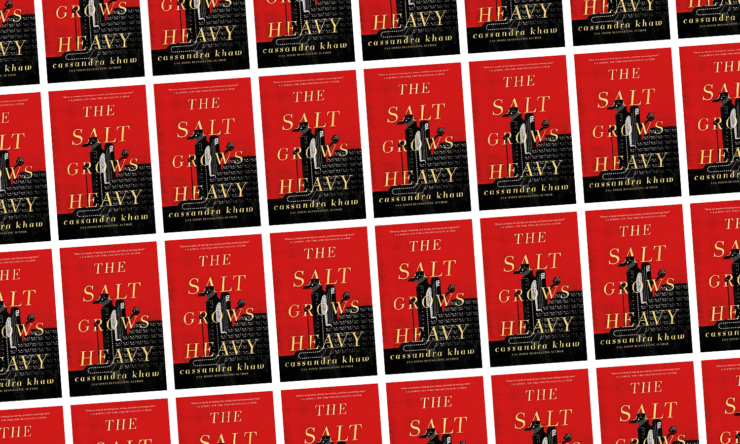Cassandra Khaw’s new novella, The Salt Grows Heavy, begins with death and consummation. On its very first page, a mermaid’s daughters clean gore from their fingertips after devouring the face, eyes, and brain of a thing that used to be human. They are, their mother muses as she watches them, “the best of their parents.” We as readers are thrown into the deep-end, as unmoored and unsteady as a sea creature on land.
In its brief and horrible 100 pages, The Salt Grows Heavy continues its assault: murder and dismemberment are commonplace, children are awash in blood, and, most importantly, love (familial, romantic, and otherwise) is present in abundance. With gorgeous prose and tender, meaty detail, Khaw guides us through an unreal fable of love and body horror. They introduce us to a mermaid and her plague doctor companion as they traverse a bleak landscape to find humanity and monstrosity irrevocably intertwined. And never once does Khaw explain the abominations we’re witnessing—our unknowing, after all, is part of its allure.
A summary of The Salt’s plot would not do it justice. The two protagonists leave behind a devastated kingdom, witness a murder and resurrection, and attempt to infiltrate a cult of feral children led by a trio of mad scientists bent on immortality. More vital, though, is the pain and trauma witnessed along the way—the splaying open of flesh only to be stitched together again, the viscera left behind, the attempts to forget or remember each resulting scar. The mermaid and her plague doctor should make an odd pair—one a supernatural creature and one (ostensibly) human; one repelled by the sight of death and one ambivalent, even hungry for it. But their individual histories of torture and control result in a shared sense of afterlife, and their present horrors unite them in musings on bodies, monstrosity, and something like resilience.
Buy the Book


The Salt Grows Heavy
The role of the body in the novella is itself a vital thing, a pulsing heart that drives its characters. They grapple, in one way or another, with how to inhabit a body that you didn’t choose, how to perform the role your body asks of you, and how to accept a body that has—ship of Theseus-style—been broken and unmade so many times it no longer feels like your own. Gender is a substantial aspect of these questions, as is sex, as are kindness and suffering. But, “like everything else,” the mermaid says of the feral children, “they are only meat.” With the likes of both birth and killing described in terms of terror, beauty, and pain, The Salt avoids easy answers. The body, Khaw seems to say, is capable of acts beyond the binaries of good and evil, self and other, alive and dead. The lack of logic to all of this is kind of the point: after all, does a life of pain ever really feel logical?
The delineation between the natural and unnatural is similarly blurred. As the plague doctor grapples with their own origins, the mermaid comforts them, not by reassuring their status as human or as morally pure in spite of the cruelty they’ve experienced, instead stating that “there is nothing wrong with being a monster.” The mermaid and plague doctor harm and are harmed, kill and are killed, multiple times throughout the story. Khaw rarely sets up an “either/or” distinction between the monster and the human, instead viewing them as “both/and”—capable of cruelty and love, creation and killing, horror and beauty. Such themes make, it turns out, for a stunning love story; wherein our lovers accept one another not in spite of their flaws but as a matter of course.
It is impossible to look away from the horror of The Salt Grows Heavy. Its feverish play on the senses and its pacing make for an experience that is simultaneously immersive and revolting. Its length, too, is perfect for this kind of story: anything more might have begged questions of its world-building or asked for explanations where none are needed. Instead, The Salt is best read as a simple violent fable, a series of bodily experiences, or even a meandering poem. Grotesque, devastating, and oddly heartening, Khaw’s voice stands out in a world mired by uncertainty and all-too-human monsters.
The Salt Grows Heavy is published by Nightfire.
Read an excerpt here.
Em Nordling is a writer & PhD student in Atlanta, GA.











I finished this book and loved it – ran straight to this review and completely agree